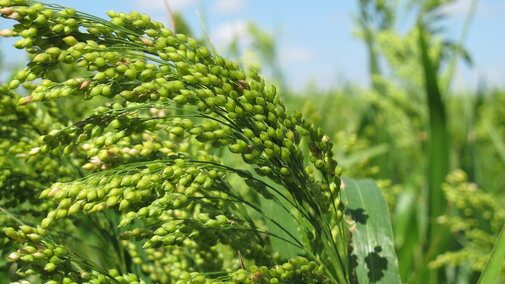Production of and new markets for proso millet will be the focus of an an international conference to be held in early August.
The Third International Millet Symposium, scheduled for Aug. 8-11 at Fort Collins, will focus on millet production in the United States and the world; millet breeding, genetics and genomics; and millet uses and products around the world.
The symposium is jointly organized by University of Nebraska-Lincoln (UNL) and Colorado State University (CSU). Chairs of the organizing committee are Dipak Santra, alternative crops breeder at the UNL Panhandle Research and Extension Center, and Jerry Johnson, Extension Crops Specialist at Colorado State University.
Much of the world’s millet production comes from China, Russia, the United States, Ukraine, India, Slovenia, and Korea, Santra said. In the United States, three states produce 95% of the domestic crop: Colorado (about 50%), Nebraska (about 25%) and South Dakota (about 20%).
The symposium will focus mainly on proso millet, also known as broomcorn millet, common millet, millet, and hog millet. But it will also include other types of millet – pearl, foxtail, finger, little millet, barnyard millet, kodo millet, and tef. These are grown commercially elsewhere in the world but in the USA, these are grown in small scale or have potential to grow, according to Santra.
The symposium is a rendezvous for millet buyers and sellers. There will be presentations by High Plains producers, millet breeders, cropping systems agronomists, millet industry partners, grain handling and processing operations from a number of countries.
Santra said the target audience from this region includes producers; crop consultants; international and domestic millet buyers and sellers; millet grain handlers and processors; food companies; ag extension personnel; scientists; researchers and students working on millet agronomy, breeding and genetics, quality and new product development.
Delegates will be at the symposium from China, India, Japan, Korea, Taiwan, Malaysia, Thailand, Hong Kong, Germany, Switzerland, Italy, France, Slovenia, Canada, and about 10 U.S. states.
Invited speakers include the Colorado Ag Commissioner and several others who are involved in growing or marketing millet at the national or international level. Brainstorm session on efforts to improve millet marketing for new uses.
The keynote speech will be by Keith Paustian, IPCC Panel Noble Laureate. The agenda will include presentations by speakers from UNL, CSU, and other land grant universities in the United States; the U.S. Department of Agriculture; and agencies and organizations related to millet research, production and marketing from other nations, including Korea, Switzerland, Germany, India, and China. There will be poster presentations and panel and open discussions.
The session on Wednesday, Aug. 8, will feature opening remarks, welcome, and keynote address by David Baltensperger, chair of the Texas A&M University Department of Crops and Soil Sciences (formerly with UNL at the Panhandle Research and Extension Center). His topic will be "Millet in the 21st Century: Relevance to Climate and Human Health."
Proso millet is a good fit for western Nebraska because it is tolerant to drought and infertile conditions, and also adapted to many adverse environments. This is due to the short growing season and because it needs very little water and little synthetic fertilizer to get a decent yield.
The International Association of Broomcorn Millet was established to promote development of the broomcorn millet, strengthen exchanges and cooperation in scientific research, and increase socio-economic development. The International Symposium on Broomcorn Millet (ISBM) is convened every two years. The first and second symposia were held in China and South Korea, respectively.
Presentations & Speakers
Thursday’s topics and presenters include:
- Millet Production and Industry around the World: Cropping Systems and Millet Production in the United States;
- Millet Production in Colorado;
- Organic Millet: Past, Present and Future in Germany and Austria;
- Production and Utilization of Millets in India;
- Production and Utilization of Broomcorn Millet in Korea;
- Millet Farming in High Plains of USA;
- Identification and Evaluation of Drought Resistance in Cultivars of Broomcorn Millet;
- Millet Breeding, Genetics and Genomics: Germplasm for Enhancing Productivity and Nutritional Quality of Proso Millet;
- High-Throughput Phenotyping in Millet and Allied Species;
- the Genome of Broomcorn Millet;
- Breeding Biofortified Pearl Millet Cultivars to Unlock Millet Markets for Nutrition;
- and Genetic Improvement of Pearl Millet in USA – Past and Present.
Friday’s agenda will focus on millet uses and marketing. Topics include:
- Millet Uses and Products from Around the World: Proso Millet Application in the Development of Gluten-Free Products;
- History and Culture of Millet in Korea;
- Analysis of Species Diversity Based on Cooking Edible Quality in Proso Millet;
- National Mission on Nutricereals of India Proso Millet as a Protein Source for Organic Poultry;
- Novel Application of Proso Millet Protein as Pharmaceutical Drug Delivery;
- Millet Marketing and Trade: Presentations by Millet Industry Representatives Regarding Millet Marketing: Finding New Potential Markets for Millet;
- the Role of the High Plains Millet Association in Promoting US Millet Industry;
- a Tour of Colorado State University.
A field tour is planned for Saturday, Aug. 11, to Kriesel Certified Seed near Gurley and the UNL High Plains Ag Laboratory near Sidney.
More Information
The symposium will be at the Marriott Inn in Fort Collins. Check the symposium’s website at https://go.unl.edu/millet2018 for details and links to register and book hotel rooms.

